- Home
- Rose Tremain
The Road Home Page 13
The Road Home Read online
Page 13
“What prevented you?” asked Sophie.
“You,” said Lev.
“Me?”
“We are waiting for Elgar when my mobile rings. I am only man with ringing phone. And ringing is you.”
Sophie shook her head as she laughed, and her robin-red curls gleamed under the bright kitchen lights. “Fuck,” she said. “Never imagined you at a posh concert. Imagined you all alone in some room. That’s how wrong I often am.”
Lev looked at Sophie’s soft arms and the lizard tattoo. And he thought how, just for a moment, he would like to stroke those arms or rest his head against them. He resumed his mopping, while Sophie went in and out with the rubbish sacks and gusts of the night air intruded on the still-warm body of the kitchen.
When the work was finished, Lev offered Sophie a cigarette and— flaunting G.K.’s laws—she took one and they stood by the two-point-five meters of steel draining top, smoking.
“So,” said Sophie, “would you like to come drinking with me?”
“Yes?” said Lev.
“You don’t sound too sure. But I don’t blame you. Sam and me, we can get a bit out of order. People drink in your country?”
“Yes,” said Lev. “Vodichka.”
“Is that, like, vodka?”
“It is vodka. It means ‘darling little vodka.’ ”
“Right. Well, we drink ‘darling little gin and tonic’ or ‘darling little Stella’ with rum or whiskey chasers. We tried absinthe one night, but I tell you, that makes you insane and we were sick as pigs.”
“Why do you drink?”
“Why do we drink? Well, why does anyone drink? Just for the way it makes the world start to look. You know?”
“Yes.”
“I work at a care home for the elderly most Sundays. Ten till six. You need a drink after that lot. No use being squeamish around old people. But they’re a laugh, too. I love them, really. You know what their favorite game is?”
“Yes?”
“Slagging.”
“Slagging?”
“Yeah. Slagging people off: criticizing them. They say, ‘I never liked So-and-so.’ Their son-in-law, say. Then it crescendos: ‘He’s such a slob. He’s a bad driver. He sends crap Christmas presents. He dyes his hair . . .’ You know? On and on. ‘He’s useless with a drying-up cloth. He wears white socks with black shoes. He broke the bird feeder.’ It gets hilarious. I encourage them. I say, ‘Right. Today over tea we’re going to have a slagging competition. See who can be nastiest.’ And they hoot with joy. I’m not kidding.”
“Yes?”
“Hate keeps people alive. One old guy, Douglas, says to me, ‘I refuse to die before my sister. She’s looked down on me for seventy-five years. Now I want to look down on her—in her grave.’ And he’s still going strong. He thinks up different ways to kill her. One of these was, he was going to break into her house and take down her curtain rails and fill them with prawns and put them back up again.”
“Prawns?”
“Yes. What G.K. calls ‘shrimp’—just because he once vacationed on Long Island. Wait for her to suffer with the stench. Drive her mad because she can’t find the source of it. Because she’s house-proud as hell, so Douglas says. Has every surface smelling of some crap polish. Dusts the lightbulbs! And the thought of her being driven away from her home by the prawn stink gives Douglas real pleasure. And I can understand that. I had a boyfriend last year I wanted to kill.”
“You wanted to kill?”
“Yeah. Haven’t you ever felt that?”
Lev remembered the longing he’d had to put a knife in the heart of Procurator Rivas, remembered lying awake on his sad bed on the floor and imagining this scene, with Marina screaming and Rivas clutching his fatal wound and falling backward in his chair, with his clomping, institutional feet sticking up in the air. Lev picked up a cloth and began gently polishing the edge of the draining top. “Maybe . . .” he said.
“I did,” continued Sophie. “I’m not joking. He was a PE instructor, my boyfriend. Fit as shit. Like an Olympic gymnast. But he kept showing his fitness off. What a wanker! He could do a backflip from a standing start. It was his party piece. And everybody went, ‘Ooh- aah, my God, how brilliant is that!’ But you get tired of someone doing backflips. I did. I kept hoping the next time he did a backflip he’d break his fucking neck. But he never did. I’d like to marry a firefighter. Someone who does something non-wanky. Know what I mean?”
Lev stared at Sophie, trying to fathom what she was saying. Her face was wide and dimpled and her breasts large, and her legs looked chunky and strong. There was nothing about her that resembled Marina in any way. But this otherness, this newness of form, fascinated him. It made her exotic, like some faraway, sun-soaked place that smelled of sugar. And he wondered what it would feel like to go to this place and breathe the candied air.
“What’re you looking at?” Sophie asked, confronting Lev’s gaze.
“Sorry,” he said. “Only looking at tattoo. Does this hurt you?”
“Nah,” said Sophie. “He’s just my lizard. He’s called Lenny. Had him done two years ago. They all know him in the care home. They say, ‘How’s Lenny today, dear?’ and I say, ‘Oh, Lenny’s fine, he’ll give you a little lick on the nose if you eat up your bread and butter.’ That’s how terrifyingly juvenile and crazy I am.”
Lev smiled. “Not crazy to me,” he said.
“Well, I am crazy,” said Sophie. “I love Lenny. When I settle down to sleep, I sometimes put my arm round my face, like this, and Lenny looks at me and we have conversations in the dark.”
Lev switched off the lights and they stood at the door for a moment, listening to the hum of the chillers in the darkness. Then they went out into the street, where a few snowflakes had begun to fall. Sophie wound her football scarf round her head. Lev pulled up his collar. He wondered where he would be able to find a winter coat he could afford.
Sophie took the padlock off her bicycle and bundled up the chain. “Night, then,” she said. “See you tomorrow.”
“Yes,” said Lev. “See you tomorrow.”
He watched her pedal off along the empty road, with the snow falling all around her. Then he made his way to the night bus stop, where he sat on the plank seat and smoked and rubbed his hands on his knees to try to warm them.
When he got home to Belisha Road, the lights were still on in the sitting room, but Christy was asleep. It was late, but Lev felt wide awake and restless. He made a cup of tea and carried it through to his room and sat down on his bunk, drinking the tea and staring at the Wendy house and the shop and the soft toys on the windowsill. One of these was a clown. Lev took it down and looked at its painted rag face and its tall felt hat. The feel of its body was squashy and soft, and Lev could imagine how much Maya would like it.
Lev looked at the time. He suddenly, desperately, wanted to call Rudi—to get news of Maya—and after some minutes of indecision, in which he imagined Rudi snoring peacefully by Lora’s side, he took out his phone and selected Rudi’s number. The phone was picked up straightaway.
“Hi, Lev,” growled Rudi. “Glad to hear your voice, comrade. No, you didn’t wake me up. Couldn’t fucking sleep at all. How’re things?”
“Okay,” said Lev. “Good. My job’s working out pretty well. Has Ina been getting the money I sent?”
“Yes. Sure she has. I took her to Baryn last Monday and we bought her a new Calor-gas heater for her jewelry-making shed. She’ll be all right now when the snow comes.”
“That’s good. It’s snowing here. What about Maya?”
“She’s fine. We were going to take her to the fair next Saturday, but I’ve got problems with the fucking Tchevi. That’s why I can’t sleep.”
“What problems?”
“Belts on the automatic drive.”
“Yes?”
“So she fucking creeps.”
“Creeps?”
“Yes. I’m maneuvering out of a parking space, say, so I get into ‘drive’
to move her forward a bit, then I select ‘reverse’ and I expect her to obey me and go fucking backward nice and slowly, but she doesn’t: she creeps forward before starting to acknowledge the gear she’s in. Then she lurches back, like a fucking kangaroo.”
“What can you do about it?”
“Fit new belts. Except I can’t locate any belts.”
“So?”
“If I had the fucking solution, Lev, I wouldn’t have been awake for this telephone call. Keep searching for belts, I guess. Or bribe somebody to make them. All I can do. But it kills me when the Tchevi’s sick. I love that car like I love my own liver.”
“I know you do.”
“And it’s my livelihood. But, meanwhile, Lora and I have dreamed up a new scheme: horoscopes.”
“Horoscopes?”
“Yeah. Everyone’s into astrology suddenly. They didn’t know what it was in the old days, but now they’re flocking to it like swine to the swill. All you gotta do is keep filling the swill bucket.”
“What are you going to fill the swill bucket with?”
“Got a few astrology books from the library. Lora’s mugging it all up. She’s got a fast-learning kind of mind. Then we’re going to advertise star-sign readings. People send their birth dates, accompanied by some hard cash, and we give them a personalized prediction of their immediate future. Four or five euros a shot.”
“Right. What if their immediate future doesn’t turn out the way you predict?”
“It will turn out the way we predict. The knack with astrology is, you word everything in such broad fucking terms it can all be made to fit. But we just have to get in fast, before some other fucker gets the same idea.”
Lev smiled. “I’d like to know my future,” he said quietly.
“Yeah?” said Rudi. “Why? Something happen to you? You sound different.”
Lev was silent. He looked over at the clown, lying on the floor with its soft limbs in an attitude of surrender. “No,” he said, “nothing’s happened. Tell me more about Maya.”
Lev heard Rudi’s broken cuckoo blurt out three o’clock. Rudi coughed, then said, “She’s okay, Lev. Truly. No more goats stolen. Oh yeah, she lost another tooth. I told her she looked like a vampire. She said, ‘What’s a vampire?’ but I couldn’t fucking remember. My mind just wouldn’t conjure it. I said we might see one at the fair, but now I don’t know if we can get to the fair.”
“Tell her to write something to me, or send a drawing.”
“Okay. What d’you want the drawing to be of?”
“Dunno. The house, maybe. She likes drawing houses. Or a sunflower.”
“It’s not sunflower time, my friend, it’s nearly winter, in case you’d forgotten.”
“I hadn’t forgotten. She can imagine a sunflower. Tell me more news.”
“What news? You know nothing happens here. You tell me more news.”
“Well,” said Lev, “I almost heard a concert.”
“Almost heard? Is that some kind of new grammatical tense?”
Lev told Rudi, and Rudi laughed so loudly that he woke Lora, and Lev heard Lora’s voice in the background saying, “What’s going on?”
“Nothing,” Rudi told her. “Just hearing about Lev making his mark in London.”
“It’s three in the morning, Rudi,” said Lora.
“I know,” said Rudi. “So talk to Lev.”
Lora came on the line and said, “Lev, we miss you. So does Maya. She’s afraid she’ll never see you again.”
Lev was silent for a moment. Then he said, “Don’t let her think that, Lora. I’m going to be sending some toys.”
He dreamed of a woman. It was the first dream of its kind Lev had had for two years. He lay down in the snow with the beautiful woman and unwound the rags that covered her, and these rags were like a skin she was discarding to reveal a body soft and shining. He told her he’d forgotten how to love, and she said, “No, I don’t believe that for a second,” and she put a hand on his neck and pulled him down toward her and kissed his mouth.
He knew he shouldn’t name the woman. Naming her would break some unspoken bond, some tacit understanding. Yet he wanted to name her, to make her real to him in this way. He felt as though he’d choke if he didn’t say her name, but he kept a rein on himself and stayed silent.
When he woke, his phone was ringing. It was Lydia.
She said, “Lev, I’m trying hard not to be angry with you, but I think your manners are very bad.”
8
The Need to Shock
FROM AN IRISH stall on Holloway Road, Lev bought an anorak with a fleece lining and a trim of nylon fur round the hood. He put it on as soon as he’d paid for it and walked away, feeling warm and glad. Then he turned and went back to the stall and bought another one, in a child’s size but identical to his, and posted it to Maya. He knew that imagining Maya in her little identical coat was going to become a habit of mind with him as the winter passed.
Christy admired the anorak. He said, “I think it looks good on yer—and I’m sayin’ this stone-cold sober.”
He was trying to stay sober most of the time now. The court had granted him “chaperoned visits” to his daughter, who was living with Angela and her estate-agent lover in a loft conversion off the Farringdon Road.
“Trouble is, the chaperone is Angela,” said Christy. “I think that’s unfair. I can’t see Frankie without seeing the woman who took her away from me. D’you think that’s right?”
“No,” said Lev. “Maybe I can be ‘chaperone’?”
“Well, I wish. But they said it has to be the mother or some female social worker. And Angela never wants to go out anywhere. I said I wanted to take Frankie to the zoo, but there was a drop of drizzle in the air so Angela says, ‘No, we’ll get soaked going round the zoo.’ Then I suggested a film.” Christy pronounced it fillem. “But she says, ‘No chance. I’m not going up the West End, it’s too hideous.’ So all we do is, we sit there and do bits of coloring or Lego. And I try to talk to Frankie about school or about her friends. She answers me, yes-no, yes-no, but she won’t look at me. She looks down at the Lego, or up at her mother. And the light in that place is so glaring, it makes me eyes sore. One whole side of the living-room wall is glass, and there’s glass all above you in bloody enormous panels. God knows how it gets cleaned, and God knows how you sleep, with the rain clattering down and the light flooding in. I wouldn’t like to live there at all.”
When Lev asked about the owner of the loft, Angela’s lover, whose name was Tony Myerson-Hill, Christy said, “The less I hear about him, the happier I am. His furniture’s ugly: big black-leather sofas, tubular-steel tables. And everything has to be in its right place or he has an epileptic fit. How he can put up with a five-year-old, I’ve no idea. And the shower’s weird. Big walk-in thing, tiled in gray granite, but with no door on it. No privacy at all. What kind of interior design is that? I think the man’s a fashion victim of the first fucking water.”
Then he told Lev that once when he was visiting Frankie all Frankie wanted to do the whole afternoon was polish stones.
Tony Myerson-Hill had bought a stone-polishing machine and said he would pay Frankie 10p for every stone she polished. Then she laid the newly shined stones in a line along the walls of the granite shower and she said Tony would be “really, really happy” about this arrangement and might take her to the zoo at the weekend.
“Get that,” Christy went on. “The zoo! I suggested the bloody zoo the very first time I went to that place. So either Frankie had no memory of it, or else she said it just to hurt me. God knows. I look around that effing glass house and I see the huge plasma-screen TV and the seven hundred and seventy-nine CDs and DVDs and the three computers and I think I’m done for. I think about this place and that little shop in your room that Frankie never played with, and I see that Myerson-Hill and loft conversions in ECI are the future and I’m the past. As far as Frankie’s concerned, I’m pretty much over.”
Lev barely knew wh
at to say to this. He remembered his father, Stefan, saying that life had moved on and left him behind—and he had been proved right. So he knew this wasn’t a thing that he could mention to Christy. Instead—as some kind of appropriate response to the desperation Christy was feeling—he began talking about a trip he’d made with Rudi to the Kalinin Mountains, a year after Marina had died.
Christy sat down in one of the wicker chairs. “Yeah, tell me, fella,” he said eagerly, as though he was glad not to have to talk about Frankie anymore.
Lev explained that the trip had been Rudi’s idea. Rudi had told him that he, Lev, needed to walk, to lose himself, to stop lying in his hammock, sunk down in sadness. Lev had said that he was all right in the hammock, but Rudi said no, it was time to get up now, time to set himself some kind of test. And Rudi had this “test” already planned and funded, so arguing with him against it was going to be fruitless.
They packed rucksacks with supplies and sleeping bags and strong boots and bought lengths of rope. Neither of them knew how to climb a rock face. Rudi said that their destination was a cave on the lower slopes of the Kalinin range. If they could reach the cave, they would have achieved their objective. When Lev had asked what that objective was, Rudi had replied, “To embrace something.”
They took three days of their leave entitlement from the lumber yard. It was early spring in Baryn, and cold, and the new green on the larch trees was a pale dust, barely visible to the eye. But even as they set off, Lev had felt his heart lift. To be traveling somewhere was, after all, better than staring at Ina’s yard, and he liked the idea of going into the mountains and becoming lost in a place where there were no people.
To reach the cave, they followed the line of the Baryn River to its stony source. There was no path, only narrow tracks here and there, made by mountain goats. Underfoot was slippery schist and ragged clumps of heather. The steady ascent made Lev’s lungs burn and he had to stop frequently to recover his breath. During these moments of rest, he looked about him and saw the snowcaps way above him and, below, the long, beige scars on the hills where pine and fir had been felled for the Baryn mill. The air was damp and clean and fragrant in a way it no longer was in Auror, and Lev became aware of a feeling of poise within himself that he hadn’t known for a long time.

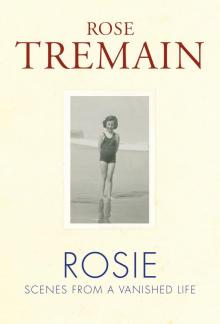 Rosie
Rosie The Garden of the Villa Mollini
The Garden of the Villa Mollini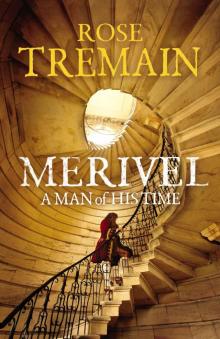 Merivel: A Man of His Time
Merivel: A Man of His Time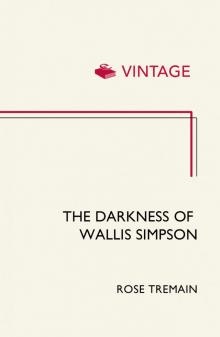 The Darkness of Wallis Simpson
The Darkness of Wallis Simpson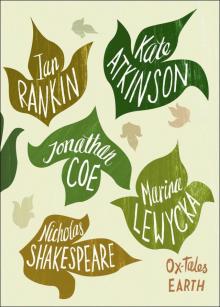 Earth
Earth Sacred Country
Sacred Country The Swimming Pool Season
The Swimming Pool Season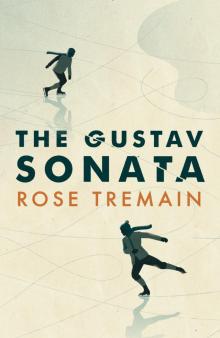 The Gustav Sonata
The Gustav Sonata Sadler's Birthday
Sadler's Birthday The Cupboard
The Cupboard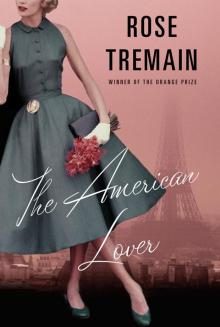 The American Lover
The American Lover Letter to Sister Benedicta
Letter to Sister Benedicta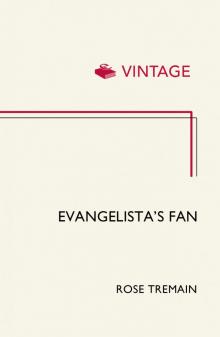 Evangelista's Fan
Evangelista's Fan Restoration
Restoration The Road Home
The Road Home The Colonel's Daughter
The Colonel's Daughter The Way I Found Her
The Way I Found Her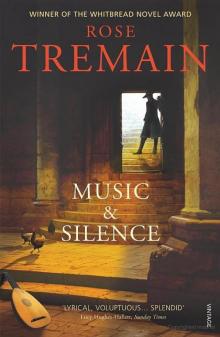 Music & Silence
Music & Silence